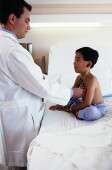(HealthDay)—Pediatric hospital medicine programs have an established place in pediatric medicine, and the expanded roles and responsibilities of pediatric hospitalists should be recognized, along with their integrated role among community pediatricians, according to a policy statement from the American Academy of Pediatrics (AAP) published online Sept. 30 in Pediatrics.
Laura J. Mirkinson, M.D., and colleagues from the AAP Section on Hospital Medicine, discuss the expanded roles and responsibilities of pediatric hospitalists and pediatricians who care for patients in and outside the hospital.
The authors put forth basic principles that can be applied to hospital medicine programs. Each pediatric hospital medicine program should be designed to meet the specific needs of the patients in the community it serves. Pediatric hospitalists and their leadership should be aware of the institution and its organizational structure. Pediatric hospitalists should develop expertize in areas including leadership, quality, safety, and performance management. Patient- and family-centered care should be promoted and pediatric hospital programs should be driven by data collection and outcome-based assessments. Pediatric hospitalists should advocate for pediatric safety and promote recognition of value added by hospitalists to hospital programs.
"The purpose of this statement has been to address the particular roles and responsibilities of pediatric hospitalists, but it is implicit in all the aforementioned recommendations that the overarching goal is always to provide the best possible care for children and protect the safety of children in the hospital setting," the authors write.
More information: Full Text
Journal information: Pediatrics
Copyright © 2013 HealthDay. All rights reserved.






















